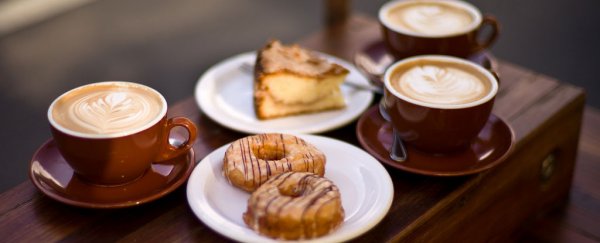Making a run to the local coffee shop to secure your caffeine fix (and maybe picking up a little snack on the side while there…) is something many of us do every day at least once, but just a single visit could see you hit a number of your daily dietary limits all at once, according to a new study.
Australian researchers from Cancer Council NSW say many people may be unaware that they're consuming their entire daily sugar or saturated fat limits in one trip to the coffee shop, and consuming half of their suggested energy intake for the whole day in a single hit.
When you think about how for most people a coffee run is just a quick beverage and/or snack in between, you know, actual meals, this starts to get a little scary.
"Many Australians rely on a take away coffee for their morning kick start but people might be unaware of just how much sugar, saturated fat and kilojoules they are consuming each day if they're ordering anything more than the standard flat white, cappuccino or latte," said Clare Hughes, a nutrition programs manager and co-author of the study.
The researchers looked at 564 menu items available from five popular Australian coffee shop chains to assess the energy, saturated fat, and sugar content of beverages and snacks, to see how they stack up against the average daily allowances health authorities recommend.
More than half (54 percent) of the cold beverages tested, such as iced coffees and chocolate drinks, contained more than half of the daily recommended sugar allowance in one serving. One such beverage, McCafé's Coffee Kick Frappe, may sound entirely delicious, but contains a whopping 19 teaspoons of sugar in just one drink – 86 percent of the amount a person is supposed to consume in a whole day.
Beverages can also conceal high amounts of saturated fat, especially if you opt for a larger size, with the researchers noting a large iced coffee from Coffee Club contains 39 grams of saturated fat, 163 percent of the recommended daily limit (and even a large chai latte can hit half the daily allowance for saturated fats).
And if you think opting for skim or low-fat options makes for a healthy choice with these kinds of beverages, guess again. Selecting skim milk for a large Tim Tam iced chocolate from Gloria Jeans may make it healthier than opting for full cream milk, but it doesn't do anything to change the fact that the drink contains 20 teaspoons of sugar – a third of the average person's entire daily kilojoule allowance.
The fact that some low-fat items are marketed as 'healthy options' for consumers concerns researchers, especially when deceptively energy-rich snacks are thrown into the mix alongside drinks.
"We found McCafé's banana bread contained 14 teaspoons of sugar and 2,570 kilojoules – that's four times the kilojoules that we should be consuming from a between-meal treat," said Hughes. "This is about the same as a McDonald's Big Mac, which we're more likely to have as part of a meal."
The researchers hope the study will bolster public awareness of the true nutritional content (or lack thereof) in coffee shop indulgences, so that people can make more informed choices about what they consume when they're out and about.
"With Australians spending a third of their weekly food budgets eating at cafés, restaurants and fast food outlets, and 63 percent of Australian adults overweight or obese, it's more important than ever to have access to healthy options," said Hughes.
"If we can stabilise or decrease obesity levels in Australia, half a million lives could be saved by 2050.That would mean fewer cases of obesity related cancers, such as bowel, endometrial and post-menopausal breast cancer; as well as heart disease and type 2 diabetes."
The research is published in Nutrition & Dietetics.
